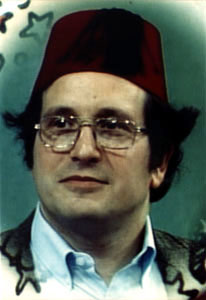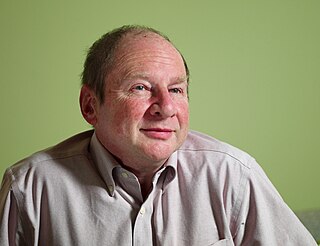Related Research Articles
Knowledge representation and reasoning is a field of artificial intelligence (AI) dedicated to representing information about the world in a form that a computer system can use to solve complex tasks, such as diagnosing a medical condition or having a natural-language dialog. Knowledge representation incorporates findings from psychology about how humans solve problems and represent knowledge, in order to design formalisms that make complex systems easier to design and build. Knowledge representation and reasoning also incorporates findings from logic to automate various kinds of reasoning.

Gerald Jay Sussman is the Panasonic Professor of Electrical Engineering at the Massachusetts Institute of Technology (MIT). He has been involved in artificial intelligence (AI) research at MIT since 1964. His research has centered on understanding the problem-solving strategies used by scientists and engineers, with the goals of automating parts of the process and formalizing it to provide more effective methods of science and engineering education. Sussman has also worked in computer languages, in computer architecture, and in Very Large Scale Integration (VLSI) design.
John Florian Sowa is an American computer scientist, an expert in artificial intelligence and computer design, and the inventor of conceptual graphs.
In computer science, reflective programming or reflection is the ability of a process to examine, introspect, and modify its own structure and behavior.

Harold Abelson is an American mathematician and computer scientist. He is a professor of computer science and engineering in the Department of Electrical Engineering and Computer Science at the Massachusetts Institute of Technology (MIT), a founding director of both Creative Commons and the Free Software Foundation, creator of the MIT App Inventor platform, and co-author of the widely-used textbook Structure and Interpretation of Computer Programs, sometimes also referred to as "the wizard book."

Jack Bonnell Dennis is an American computer scientist and Emeritus Professor of Computer Science and Engineering at Massachusetts Institute of Technology.

Silvio Micali is an Italian computer scientist, professor at the Massachusetts Institute of Technology and the founder of Algorand, a proof-of-stake blockchain cryptocurrency protocol. Micali's research at the MIT Computer Science and Artificial Intelligence Laboratory centers on cryptography and information security.

Charles Eric Leiserson is a computer scientist and professor at Massachusetts Institute of Technology (M.I.T.). He specializes in the theory of parallel computing and distributed computing.

Wallace "Wally" Feurzeig was an American computer scientist who was co-inventor, with Seymour Papert and Cynthia Solomon, of the programming language Logo, and a well-known researcher in artificial intelligence (AI).
Douglas Taylor "Doug" Ross was an American computer scientist pioneer, and chairman of SofTech, Inc. He is most famous for originating the term CAD for computer-aided design, and is considered to be the father of Automatically Programmed Tools (APT), a programming language to drive numerical control in manufacturing. His later work focused on a pseudophilosophy he developed and named Plex.
Gul Agha is a professor of computer science at the University of Illinois at Urbana-Champaign, and director of the Open Systems Laboratory. He is known for his work on the actor model of concurrent computation, and was also Editor-in-Chief of ACM Computing Surveys from 1999 to 2007. Agha was born and completed his early schooling in Sindh, Pakistan. Agha completed his B.S. with honors at the California Institute of Technology in the year 1977. He received his Ph.D. in Computer and Communication Science from the University of Michigan in 1986 under the supervision of John Holland. However, much of his doctoral research was carried out in Carl Hewitt's Message-Passing Semantics Group at Massachusetts Institute of Technology (MIT). Agha's dissertation was published by the MIT Press as Actors: a model of concurrent computation in distributed systems, a book which, according to the ACM Guide to Computing Literature, has been cited over 3000 times.
Ashwin Ram is an Indian-American computer scientist. He was chief innovation officer at PARC from 2011 to 2016, and published books and scientific articles and helped start at least two companies.

Akinori Yonezawa(born June 17, 1947) is a Japanese computer scientist. Professor Emeritus of the University of Tokyo. Received Ph.D. from the Massachusetts Institute of Technology (MIT). Currently, a senior fellow at the Chiba Institute of Technology, Software Technology and Artificial Intelligence Research Center. Former member of the Science Council of Japan. Specializes in object-oriented programming languages, distributed computing and information security. From its beginning, he contributed to the promotion and development of object-oriented programming, which is the basis of programming languages most commonly used today, and served as a program committee member and chairman of the main international conferences OOPSLA and ECOOP. At the same time, he is internationally known as a pioneer of the concepts and models of “concurrent/parallel objects". In software systems constructed based on concurrent/parallel objects, information processing and computation proceed by concurrent/parallel message passing among a large number of objects. Yonezawa's concurrent (parallel) objects are influenced by Actors, the concept of which was proposed by Carl Hewitt at MIT's AI Lab in the early 1970s and later rigorously formulated by Gul Agha. However, concurrent objects and actors are fundamentally different. An actor is an object that does not have a "state," whereas Yonezawa's concurrent (parallel) object can have a persistent state. For this reason, concurrent (parallel) objects are often used in implementing large parallel processing software systems. Large-scale software systems built and put into practical use based on concurrent (parallel) objects include an online virtual world system Second Life, social networking services such as Facebook and X (Twitter), and large-scale molecular dynamics simulation systems such as NAMD.
William D. Clinger is an associate professor in the Khoury College of Computer Sciences at Northeastern University. He is known for his work on higher-order and functional programming languages, and for extensive contributions in helping create and implement international technical standards for the programming language Scheme via the Institute of Electrical and Electronics Engineers (IEEE) and American National Standards Institute (ANSI). Clinger was an editor of the second through fifth Revised Reports on Scheme (R2RS – R5RS), and an invited speaker on Scheme at the Lisp50 conference celebrating the 50th birthday of the language Lisp. He has been on the faculty at Northeastern University since 1994.

Carl Eddie Hewitt was an American computer scientist who designed the Planner programming language for automated planning and the actor model of concurrent computation, which have been influential in the development of logic, functional and object-oriented programming. Planner was the first programming language based on procedural plans invoked using pattern-directed invocation from assertions and goals. The actor model influenced the development of the Scheme programming language, the π-calculus, and served as an inspiration for several other programming languages.
Informatics is the study of computational systems. According to the ACM Europe Council and Informatics Europe, informatics is synonymous with computer science and computing as a profession, in which the central notion is transformation of information. In some cases, the term "informatics" may also be used with different meanings, e.g. in the context of social computing, or in context of library science.
Louis Hodes was an American mathematician, computer scientist, and cancer researcher.
David Luckham is an emeritus professor of electrical engineering at Stanford University. As a graduate student at the Massachusetts Institute of Technology (MIT), he was one of the implementers of the first systems for the programming language Lisp.
David Leigh Waltz was a computer scientist who made significant contributions in several areas of artificial intelligence, including constraint satisfaction, case-based reasoning and the application of massively parallel computation to AI problems. He held positions in academia and industry and at the time of his death, was a professor of Computer Science at Columbia University where he directed the Center for Computational Learning Systems.

Cynthia Solomon is an American computer scientist known for her work in popularizing computer science for students. She is an innovator in the fields of computer science and educational computing. While working as a researcher at Massachusetts Institute of Technology (MIT), Solomon took it upon herself to understand and program in the programming language Lisp. As she began learning this language, she realized the need for a programming language that was more accessible and understandable for children.
References
- ↑ Brian Cantwell Smith, Procedural Reflection in Programming Languages, Department of Electrical Engineering and Computer Science, Massachusetts Institute of Technology, PhD Thesis, 1982.
- ↑ Brian C. Smith, Reflection and semantics in a procedural language Archived 2015-12-13 at the Wayback Machine . Technical Report MIT-LCS-TR-272, Massachusetts Institute of Technology, Cambridge, Mass., January 1982.
- ↑ "Age of Significance". 2024. Retrieved 2025-01-05.
{{cite web}}: CS1 maint: url-status (link)